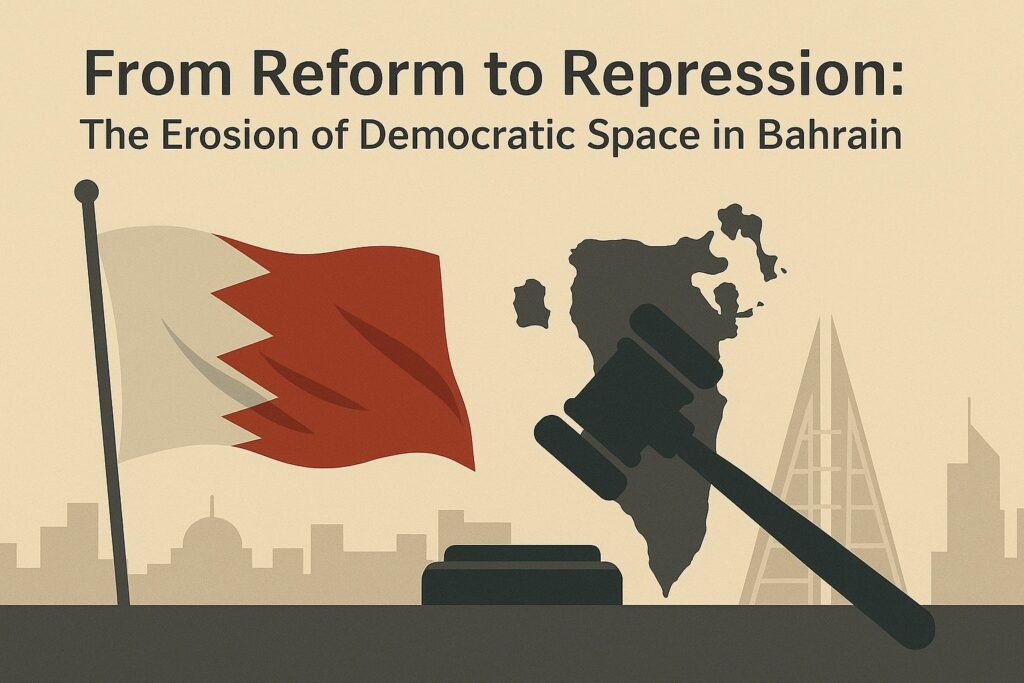From Reform to Repression: The Erosion of Democratic Space in Bahrain

At the dawn of the 21st century, Bahrain appeared to be embarking on a promising path of political reform and expanded public freedoms—particularly in the media sector. During this period, two independent newspapers, Al-Wasat and Al-Waqt, emerged as rare platforms for critical journalism. They boldly tackled controversial topics typically avoided by state-aligned outlets, offering readers nuanced perspectives absent from official narratives.
However, this fragile experiment in independent media was short-lived. In 2010, Al-Waqt ceased publication, officially due to financial difficulties. That left Al-Wasat alone in an increasingly hostile media landscape dominated by pro-government outlets that promoted state narratives and avoided criticism. Following the 2011 pro-democracy protests, Al-Wasat became the sole outlet giving voice to dissent. The authorities, viewing this as a threat, suspended the paper twice before shutting it down permanently in 2017.
From Newspapers to Tweets: Freedom of Expression Shrinks
As professional journalism retreated, the public discourse migrated online—particularly to the platform now known as X (formerly Twitter). But as online platforms grew in influence, so too did state efforts to control them. According to reports by Citizen Lab and Amnesty International, Bahraini authorities employed advanced surveillance tools—including the Israeli spyware Pegasus—to target activists, journalists, and political dissidents between 2016 and 2021.
This digital crackdown did not spare pseudonymous users. The state’s use of spyware and other tracking tools pushed the entire online community toward heightened self-censorship, mirroring the kind of internal editorial controls once seen in traditional newspapers. Public debate narrowed rapidly, turning social media into a risky space where open critique became an act of personal endangerment.
Legislating Silence: The 2020 Civil Service Amendments
Alongside technological repression, the Bahraini government has systematically introduced legal measures to institutionalize restrictions on expression. The most striking of these was the 2020 amendment to the Civil Service Law, which explicitly authorized the dismissal of government employees who criticize state policies through any medium. This provision directly contravenes Article 19 of the International Covenant on Civil and Political Rights, which Bahrain has ratified, and represents a legal codification of repression.
In practice, the list of “untouchables” has grown far beyond the royal leadership. Criticizing figures such as the Minister of Interior, the Commander-in-Chief of the Bahrain Defense Force, ministers, or even municipal council members can now result in legal action, termination, or imprisonment.
Punishment for Speech: Recent Cases
This shift has materialized in a series of high-profile cases. Activist Lulwa Al-Benali was dismissed from her position at the Ministry of Education after she publicly criticized the ministry’s leadership. Similarly, Ebrahim Sharif, former Secretary-General of the secular Wa’ad party, was arrested for a tweet questioning the state’s continued investment in the McLaren automotive company, a luxury brand partially owned by Bahrain’s sovereign wealth fund and known to be of strategic interest to high-ranking officials.
Even commentary on public services has become perilous. Activist Fadhel Abbas was detained for over a week after criticizing the government’s handling of pension reforms. Journalist Saleh Al-Oum was also arrested after critiquing a municipal council chairperson and sentenced to ten days in prison—later commuted to alternative sentencing.
Criminalizing Solidarity: External Issues Under Scrutiny
In a more recent escalation, the government has expanded its crackdown to include citizens expressing solidarity with external causes. In late 2023, approximately 90 Bahrainis were summoned for questioning after posting condolences for the late Secretary-General of Hezbollah or voicing support for Palestinians and Lebanese civilians amid Israeli attacks. This suggests a growing intolerance not only of political dissent but also of emotional expression deemed politically inconvenient.
Targeting Digital Journalism
The assault on free expression has also targeted independent digital media. In December 2024, a Bahraini court ordered the closure of the news site Delmon Post and fined journalist Mohammed Al-Ghasra 1,000 Bahraini dinars (approximately $2,650 USD) for allegedly operating without a license—despite his ongoing attempts to register the platform with the Ministry of Information.
International Rankings Reflect Decline
These developments have not gone unnoticed. Bahrain continues to rank among the least free countries in global freedom indices. Freedom House designates Bahrain as “Not Free,” while Reporters Without Borders ranks the country poorly in terms of press freedom. Both organizations cite widespread censorship, harassment of journalists, and state control of media as persistent issues.
But what is unfolding in Bahrain is more than a crackdown on opposition. It is a deliberate re-engineering of public space based on strict compliance and enforced silence. This creates a chilling effect that discourages participation in public discourse and erodes the very fabric of democratic society.
The state’s monopoly over information and narrative may provide short-term control, but it risks long-term instability. As the avenues for peaceful expression close, the likelihood increases that suppressed grievances will find more radical outlets. The suffocation of dissent does not produce a compliant society—it produces a volatile one.
In this context, the Bahraini government must reconsider its media and political strategies. Freedom of expression is not a luxury, nor is it a Western import—it is a foundational pillar of any healthy and stable society. Allowing space for dissent, criticism, and debate is not only a constitutional obligation; it is a political necessity.